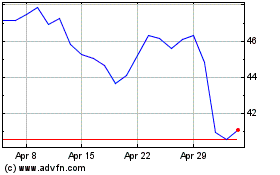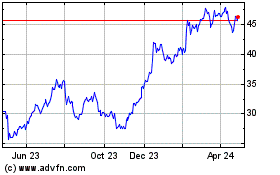Carlyle Group's Sarkozy: Euro Needs To Be A 'Real Currency'
May 16 2012 - 7:46PM
Dow Jones News
The euro zone needs to tackle key structural issues and make the
euro a "real currency" to deal with its ongoing debt crisis,
Olivier Sarkozy, head of the global financial services team at
Carlyle Group LP (CG), said Wednesday.
Recent political uncertainty in Greece has heightened concerns
that the country could exit the euro zone and has reignited worries
about contagion risks to the monetary union's larger economies.
The euro "has to become a real currency" for the euro zone to
stay together, Sarkozy said while speaking at the Global Private
Equity conference in Washington.
For that to happen, "ultimately Europe has to get
cross-collateralized by Germany," he said. "If a euro zone is to
remain in place it's got to have in its center that German economic
engine, because otherwise it's just not credible"
Also, while the euro has held up relatively well, currency
investors need to be extremely careful, because the European
Central Bank balance sheet has become "increasingly constrained,"
he said. It already has surpassed that of the U.S. Federal Reserve
to reach $4 trillion, an "unsustainable" level, according to
Sarkozy, who is the half-brother of the former French president,
Nicolas Sarkozy.
The ECB will need to "print trillions before they can get
themselves out of this mess," he said. Sarkozy warned that market
reaction to any large increase in the amount of euros in
circulation, will put "lots of pressure on the currency."
Meanwhile, the latest developments in Greece could trigger talks
of a third round of liquidity injections into Europe's financial
system, through long-term refinancing operations, or LTROs, Sarkozy
said. The ECB pumped more than EUR1 trillion into the region's
banking sector in the form of three-year loans in December and
February.
But "don't be fooled" by such a near-term "antibiotic," Sarkozy
said. "We are going to run out of these pills, and when we do we're
going to have to figure out something fast."
While past LTROs have helped stabilize the financial system in
Europe, they remain "inefficient" and haven't come close to dealing
with structural issues, he said. At the heart of the problem in the
euro zone, beyond the high levels of sovereign debt, is the banking
system's liquidity issue, Sarkozy said.
Europe's banks, with $55 trillion in assets, are primarily
funded by channels other than deposits, providing a "far less
stable source of financing than deposits," he said. As a result,
the banking sector has hoarded liquidity to ensure ongoing
solvency. They went from being the biggest buyers of European
sovereign debt to the biggest sellers in August, when there was a
run on the liquidity of the European banking system, he added.
To address this issue, the banking system needs to shrink down
to a more stable size, about $32 trillion in assets, Sarkozy
said.
By Erin McCarthy, Dow Jones Newswires, 212-416-2712;
erin.mccarthy@dowjones.com
Carlyle (NASDAQ:CG)
Historical Stock Chart
From Jun 2024 to Jul 2024

Carlyle (NASDAQ:CG)
Historical Stock Chart
From Jul 2023 to Jul 2024
